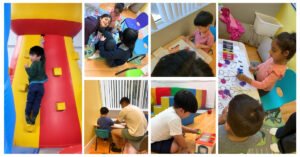Social functioning is one of the most critical developmental areas for children, and it can be particularly challenging for children with autism and anxiety. Impaired social interaction is a key feature of autism, and many children on the autism spectrum struggle to develop the skills needed to connect with others. When a child also has anxiety, these social difficulties can become even more overwhelming.
For children with autism, learning essential social skills early on is vital. With the right guidance, they can overcome many challenges and develop the confidence needed to interact effectively with others. This blog will explore the importance of social skills training for children with autism and anxiety, outline strategies to teach these skills, and highlight how early intervention can lead to long-term success.

What Are Social Skills?
Social skills refer to the behaviors, customs, and rules that govern how we interact and communicate with others. These skills are typically learned early in life, through observation and imitation of those around us. Social skills include the ability to:
- Listen actively
- Use eye contact appropriately
- Understand nonverbal cues like facial expressions and body language
- Take turns during conversations
- Express thoughts and emotions clearly
- Show empathy and consideration for others
For children with autism, these skills may not develop as naturally. They may struggle to interpret social cues or understand how to engage in reciprocal conversations. This can lead to feelings of isolation or frustration, particularly when combined with anxiety, which can exacerbate these challenges.
Why Social Skills Training is Crucial for Children With Autism and Anxiety
Children with autism often experience delays or deficits in their social skills. These challenges can be intensified by anxiety, which may cause a child to avoid social situations altogether. Social skills training can play a transformative role in helping these children develop the abilities they need to thrive in various social contexts.
Here are some key benefits of social skills training:
- Improved Communication: Social skills training teaches children how to express themselves more clearly and understand the emotions of others.
- Better Relationships: By learning how to engage with peers, children with autism and anxiety can form meaningful friendships, reducing feelings of loneliness.
- Reduced Anxiety: As children become more confident in their social abilities, their anxiety in social situations often decreases.
- Enhanced Independence: With improved social functioning, children are better equipped to navigate school, family life, and community activities.
How Autism and Anxiety Affect Social Skills Development
Autism spectrum disorder (ASD) and anxiety can affect children in different ways, but both conditions commonly impact social skills. Children with autism often struggle with:
- Maintaining Eye Contact: Many children with autism find it uncomfortable to make or maintain eye contact during conversations.
- Understanding Nonverbal Cues: They may have difficulty interpreting facial expressions, body language, or tone of voice, which are crucial for social interaction.
- Starting and Maintaining Conversations: Engaging in back-and-forth dialogue can be challenging, as children with autism may not understand the give-and-take nature of conversation.
- Adapting to Social Norms: Understanding unspoken social rules, such as taking turns or sharing, may not come naturally.
Anxiety can further complicate these issues, leading to avoidance of social interactions altogether. Children with anxiety may feel overwhelmed in social situations, fearful of being judged, or unsure of how to respond to others. This combination of autism and anxiety can create a barrier to effective communication and meaningful social engagement.

Effective Strategies for Teaching Social Skills to Children With Autism and Anxiety
Fortunately, there are several proven strategies for helping children with autism and anxiety develop social skills. These strategies can be used in various settings, including at home, in therapy, or at school.
1. Play-Based Learning
Play is a natural way for children to learn social skills, and it can be particularly effective for children with autism. By engaging in structured play activities, children can practice essential social behaviors in a fun and supportive environment.
How to Use Play for Social Skills Development:
- Use games like “Simon Says” to teach following instructions and taking turns.
- Encourage role-playing games where your child can practice introducing themselves, asking questions, or sharing.
- Play board games that involve waiting turns, cooperating with others, and managing emotions when winning or losing.
2. Social Stories
Social stories are a tool often used to help children with autism understand social situations. These are short, simple narratives that explain a social scenario and provide a model for how to behave.
Example of a Social Story:
- “When I go to the park, I will see other children playing. I can ask someone, ‘Can I play with you?’ If they say yes, I will play with them and have fun. If they say no, I can find something else to do.”
Social stories can be customized to fit your child’s specific challenges, helping them rehearse responses to situations they may find stressful.
3. Visual Supports
Visual tools, such as flashcards, pictures, or posters, can be very effective for children with autism. These supports help reinforce social rules and make abstract concepts more concrete.
Using Visual Supports for Social Skills:
- Create flashcards with different facial expressions to help your child identify emotions.
- Use picture schedules to explain social routines, like greeting someone or asking for help.
- Post reminders around the house for behaviors like “Use your indoor voice” or “Wait your turn.”
4. Modeling and Observation
Children with autism and anxiety often benefit from watching others perform social behaviors. Observing peers, adults, or even characters in videos can help them understand how to interact in different situations.
Ways to Incorporate Modeling:
- Watch videos of social interactions and discuss the behaviors you observe.
- Model appropriate social behavior in real-life situations, such as making eye contact or saying “thank you.”
- Encourage your child to observe how other children behave at school or in the playground.
5. Positive Reinforcement
Positive reinforcement is a key strategy in social skills training. By rewarding appropriate social behaviors, you encourage your child to continue practicing them.
Examples of Positive Reinforcement:
- Praise your child when they use good manners or follow social rules: “Great job asking to play with your friend!”
- Provide rewards, such as a favorite toy or activity, when your child successfully navigates a social situation.
6. Social Skills Groups
Social skills groups offer a structured environment for children with autism and anxiety to practice interacting with others. These groups are led by professionals and often involve role-playing, games, and discussions that focus on improving communication, empathy, and problem-solving.
Benefits of Social Skills Groups:
- Children get to practice in a safe, supportive setting with peers who face similar challenges.
- Group activities can help children learn how to share, cooperate, and resolve conflicts.
7. Role-Playing Real-Life Scenarios
Role-playing is an interactive method that allows children to practice responding to real-life situations in a controlled setting. This can help reduce anxiety by giving children a chance to rehearse appropriate behaviors before they encounter similar situations in the real world.
Role-Playing Scenarios:
- Practicing how to order food at a restaurant.
- Role-playing how to ask for help from a teacher at school.
- Pretending to introduce themselves to a new friend.
How Early Intervention Can Lead to Long-Term Success
Starting social skills training at a young age can have profound long-term benefits for children with autism and anxiety. Early intervention helps children develop the foundational social skills they need to succeed in school, build friendships, and lead fulfilling lives. As they grow, these skills will become second nature, making it easier for them to navigate new social situations with confidence.
Helping Your Child Thrive

Social skills training is a powerful tool for children with autism and anxiety. It helps them overcome barriers to communication, reduces social anxiety, and opens the door to meaningful relationships. By using strategies such as play-based learning, social stories, visual supports, and role-playing, you can help your child develop the confidence and skills they need to interact with the world around them.
If you’re interested in learning more about how social skills training can benefit your child, visit Kidstart Pediatric Therapy today. Our team of experts is here to support your child’s growth and development every step of the way.






